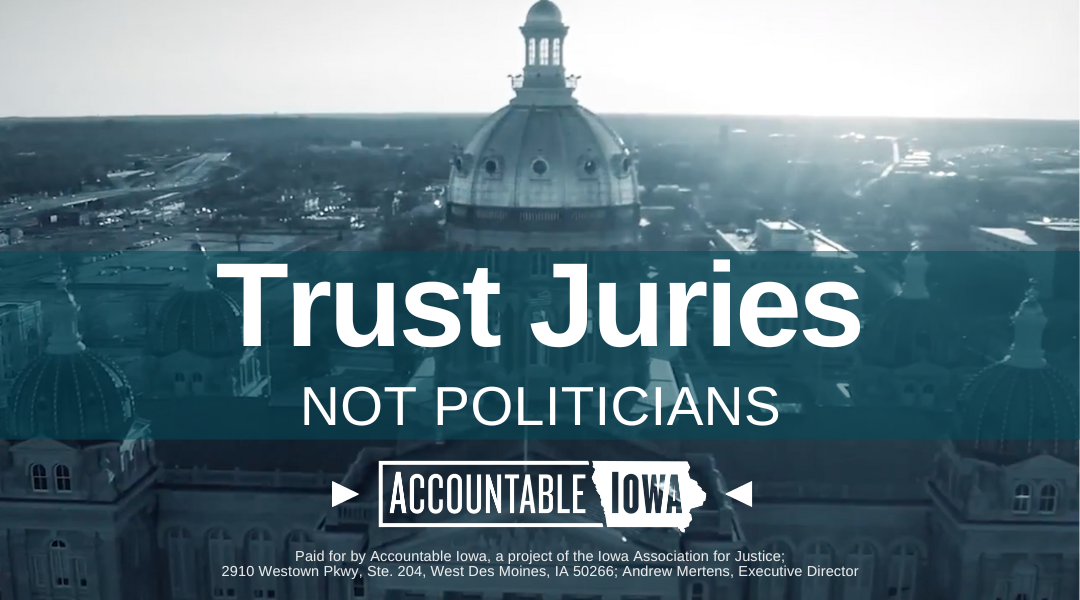The following bills were passed out of committee last week and are ready for debate. These are not the only ones. Many others I reported on in previous newsletters are also ready for debate, but I did not want to repeat information.
Senate AEA Bill – The Senate Education Committee scrapped the governor’s version of the AEA Reform bill and, keeping in mind the governor’s goals of accountability for cost and increased oversight, listened to and worked with the AEAs and superintendents and came up with the following:
- AEA’s will continue to provide special ed. Services, general education services, Early Access and Child Find services for children from birth to 3 years old, media services and professional development (PD) services as they do now. PD must be approved by the Dept. of Ed.
- Currently the schools simply pass AEA-designated funding through to the AEA’s. Under this proposal the schools can decide to use part of the funding to contract with their current AEA or another AEA or contract with another district or districts or a private company or provide the services in-house. Here is how it would work:
- Year 1 (Fiscal Year beginning July 1, 2024): AEAs will receive the following funds: 100% of funds for special education support services, 40% of funds for media services, AEA teacher salary supplement and professional development district costs, and 40% of funds for educational services.
- Year 2 (Fiscal Years beginning July 1, 2025) and beyond: AEAs will receive the following funds: 10% of the funds for special education services, 40% of the funds for media services, AEA teacher salary supplement and professional development district costs, and 40% of the funds for educational services.
- The 60% of media and educational services funding that districts retain in Year 1 may be used by them to provide those services with their AEA or a different option.
- The 90% of special education services funding districts retain in Year 2 and beyond may be used by them to provide services their AEA or a different option.
- Annually by January 1, each AEA must report to each school district it serves a monetary accounting of payments the AEA received from the district during the previous fiscal year and a description of the services the AEA provided to the school district during the previous fiscal year, including a calculation of the cost per pupil for each category of service. Currently schools do not know how much AEA services actually cost per pupil.
- Districts will annually decide whether to contract with an AEA for special education services by February 1.
- The AEA must charge reasonable costs consistent with current market rates for services.
- The AEA must provide an annual report that describes the progress the AEA has made to improve the outcomes achieved by students receiving special education services and a description of how the AEA is focusing the money it receives on the classroom.
- The Dept. of Ed. Will have oversight of special education beginning July 2025. Current AEA employees focused on oversight will still be working in AEA facilities but will be reportable to the Dept. of Ed.
- AEA accreditation standards are updated to add more accountability for special education services. The special education division in the Dept. of Education has the authority to suspend the accreditation of an AEA program if remediation is needed.
- AEA’s will be required to reduce expenses associated with executive administration by at least 30% by July 1, 2026.
- 10)The salary of an AEA administrator will still be set by the board, but it must not exceed 125% of the average salary of all superintendents in the boundaries of the AEA.
- The Dept. of Ed. and AEA’s must take an inventory of all land and facilities owned by the AEA. There is no action regarding transfer of ownership of those properties.
- 12)The minimum teacher salary is raised to $46,251. The Department of Management will adjust the Teacher Salary Supplement district cost per pupil for districts which cannot meet the minimums with their current TSS funding.
I have heard a lot of input on this bill. It did pass out of the Senate Education Committee last week but I did not support it coming out of committee. I felt it was moving changes along too rapidly for AEA’s and schools to adjust. I believe more work needs to be done on this bill and I hope more changes will be made. While I understand the governor’s concerns with costs, efficiency, and oversight, and those concerns should be reflected in the final product, I also want to ensure schools know they will be able to provide all the services students are currently receiving under the present system.
Elections Bill – Adds a voter ID requirement for returning absentee ballots (currently nothing required for returning absentee ballots), prohibits ranked choice voting, prohibits ballot drop boxes, establishes a real-time voter registration verification pilot program, changes the window slightly for early in-person absentee and satellite voting, makes changes regarding conditions for objecting to a candidate for federal office, and updates the Safe at Home program.
Citizenship Verification for Voters: Requires a one-time U.S. citizenship verification for all registered voters and a U.S. citizenship verification for those registering to vote.
“Duty to Warn” Labeling – Protects the manufacturer of a pesticide, insecticide, or herbicide from being sued under a “duty to warn” claim if their products have a compliant EPA or Federal Insecticide, Fungicide, and Rodenticide Act (FIFRA) warning label.
Grain Indemnity Fund Modernization – Raises the floor and ceiling of the Grain Indemnity Fund to $8 million and $16 million dollars, respectively.
Land Acquisition Restrictions – Restricts the DNR from acquiring property through auctions and nonprofits that acquired property through an auction or other competitive manner. Under the bill, the DNR may only acquire property though willing donors and sellers. It also clarifies that the DNR is restricted from acquiring property through donation from a nonprofit that directly purchased the property at an auction.
Patient’s “Right to Save” Act – Requires health care providers to set a discounted cash price they will accept for specific health care services. A patient can use the cash price against their deductible. Insurance companies are prohibited from preventing health care providers from offering cash discount prices.
Blood Donations – A person can donate blood for their own use or have it specified to be used by a certain individual if a physician has ordered it for a medical procedure that in their judgment might require a blood transfusion.
Right to Try – Expands our current Right to Try law by allowing more than just patients will a terminal illness to try experimental treatments. It will also allow patients who have a life-threatening or severely debilitating illness or rare diseases who may otherwise have no other treatment option to try customized, experimental treatments.
Full-Day Preschool Option – Gives schools the option under the current statewide voluntary preschool program to phase in full-day preschool for students whose household income is at or below 185 percent of the federal poverty level. I voted No in Committee because, while recognizing workforce challenges, I am concerned about government incentivizing pulling families apart at these young ages as studies show families, no matter what their income level, need more time together not less. It’s concerning the trend this bill is heading.
Boards and Commissions – Completes the reforms of last year’s state reorganization bill regarding the state’s numerous boards and commissions. The bill was amended in committee to pull out the merging of medical licensure boards; instead they will all remain separate. Input will continue to be taken as more changes will need to be made to this bill.
Collective Bargaining Reform – Addresses a loophole in the 2017 collective bargaining reform law. Under Public Employee Relations Board (PERB) rules adopted after 2017, public employers are required to submit a list of their employees to PERB to develop the voter list for union recertification elections. These elections are designed to occur once per contract. They are essentially a performance review for the unions. If the employer fails to provide the employee list to PERB, no election occurs and the union is recertified by default. In recent years, approximately 40 percent of public employers failed to supply their employee lists to PERB. This undermines the recertification election process.
This bill codifies the requirement that employers provide the list of employees to PERB. If the employer fails to provide the list, PERB is required to send notice of the failure to the employer and the union. PERB is required to give the employer ten days to provide the list. If the employer fails to provide the list in the ten-day period, PERB shall grant a five-day period for either the employer to provide the list of employees or the union to file a petition in district court to compel the employer to provide the list of employees. If neither occurs, then PERB shall decertify the bargaining unit.












